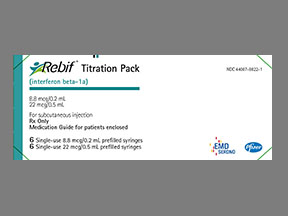
Rebif Titration Pack Coupons & Savings Card – Discount Prices from $11528.32
My prescription
Edit
4.2ML of 6X8.8 & 6X22MCG, Rebif Titration Pack (1 Box)
Select pharmacy

Walgreens
$11528.32
COUPON PRICE
Albertsons
$11528.77
COUPON PRICE
Walmart
$11869.61
COUPON PRICERebif Titration Pack savings card
Show this card to your pharmacist
Walgreens
$11528.32
BIN
ID
PCN
GRP
015995
LHKPY246437
GDC
DR33
Powered by
Price history for Rebif Titration Pack
1 Box, 4.2ML of 6X8.8 & 6X22MCG
Average retail price for Rebif Titration Pack
Average SaveHealth price for Rebif Titration Pack
Our price history data is based on aggregated prescription data collected from participating pharmacies in America. Our prescription data updates daily to reflect the latest price changes. If you notice a missing data point, it means there wasn't sufficient data available to generate a monetary value for that date.
*Retail prices are based on pharmacy claims data, and may not be accurate when we don't have enough claims.
Rebif Titration Pack dosage forms
Dosage Quantity Price from Per unit 4.2ML of 6X8.8 & 6X22MCG 1 Box $11801.04 $11801.04 4.2ML of 6X8.8 & 6X22MCG 2 Boxes $23594.58 $11797.29 4.2ML of 6X8.8 & 6X22MCG 3 Boxes $35388.12 $11796.04
| Dosage | Quantity | Price from | Per unit |
|---|---|---|---|
| 4.2ML of 6X8.8 & 6X22MCG | 1 Box | $11801.04 | $11801.04 |
| 4.2ML of 6X8.8 & 6X22MCG | 2 Boxes | $23594.58 | $11797.29 |
| 4.2ML of 6X8.8 & 6X22MCG | 3 Boxes | $35388.12 | $11796.04 |
What does Rebif do to your body?
Rebif is an interferon beta-1a medication used to treat relapsing forms of multiple sclerosis (MS). It works by modulating the immune system to reduce inflammation and slow the progression of the disease. Rebif helps decrease the frequency of relapses and may delay the accumulation of physical disability associated with MS.
Is Rebif self-administered?
Yes, Rebif is typically self-administered. It is an injectable medication used for the treatment of multiple sclerosis, and patients are usually trained by healthcare professionals on how to properly inject it themselves.
What does Rebif do for MS?
Rebif is a medication used to treat multiple sclerosis (MS). It helps to reduce the frequency of relapses and slow the progression of physical disability associated with MS. Rebif is an interferon beta-1a, which works by modulating the immune system to decrease inflammation and prevent damage to the nervous system.
